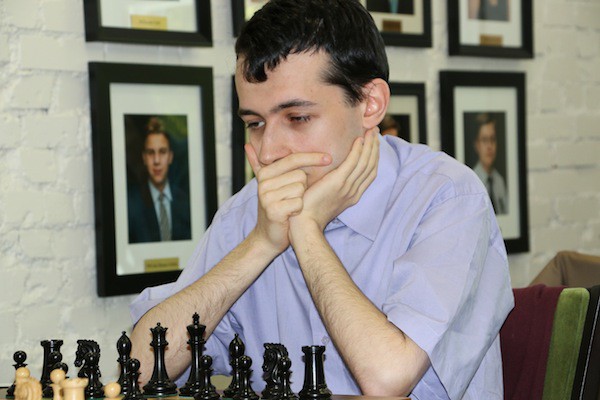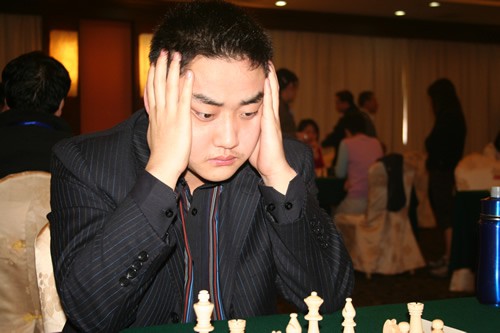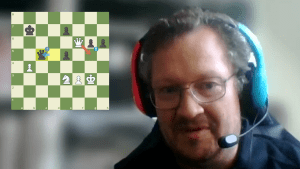
Two Gold Medal Winners in Death Match 27
After a brief summer break, Chess.com's Death Match returns less than three days from now with a battle between two gold medal winners.
GM Wang Yue (China, FIDE 2713) will take on GM Aleksandr Lenderman (USA, FIDE 2584) in Death Match 27 on Saturday, September 6 at 9 a.m. Eastern (GMT -5), 6 a.m. Pacific, 3 p.m. Central European.
The two grandmasters will play three hours of blitz and bullet for a $1,000 total prize fund, broadcast live on Chess.com/TV.
Despite living continents away, the players have actually met in real life and even at the board. Wang and Lenderman both participated in the China-USA match held in July 2013 in Ningbo, China. They played one classical game (won by Wang) and two rapid (1.5-0.5 for Wang.) Here's the first game they played, which saw a nice final move:
Although based on just three games, the individual score isn't great for Lenderman. And also rating-wise, Wang Yue seems to be the heavy favorite for this Death Match.
But is this really true? To the question which of the three time controls (5+1, 3+1 and 1+1) he prefers, the Chinese GM answered: “I like classal chess, so maybe 5+1 is better for me. ”
”
At first, Lenderman -- whose top rating is 2619 (December 2012-January 2013) -- seemed happy to take the underdog role. He described his battle against the Olympic gold medal winner “a challenge,” adding: “I'll learn something from the match.”
But maybe things are not so straightforward?
“I don't necessarily consider myself a clear underdog, maybe only slightly, since blitz, and especially bullet is very unpredictable, and I've played blitz a lot when I was younger,” said Lenderman. “I think if I prepare well it should be a very interesting battle, and might come down to the wire.”

Aleksandr Lenderman: the underdog, but maybe not so much?
Only weeks before his 25th birthday, Lenderman has been a GM for five years now. He's not the only gold medal winner in this Death Match: in 2005 he won the Under 16 World Youth Chess Championship in Belfort, France in impressive style, winning eight games and drawing two.
His general approach is “to do the maximum that I can in every game, every move,” as told to Chess.com editor FM Mike Klein in 2012. (Full disclosure: Klein was one of Lenderman's coaches at his middle school in Brooklyn, New York in the early 2000s.) Back then, Lenderman already mentioned how important it was to “keep his inner peace,” and if he manages to do that, who knows what can happen?

Lenderman's preferred time control is 1+1, so don't get fooled when Wang Yue takes a lead in the first hour. This might be another Death Match that won't be over till it's over!
Wang Yue comes fresh from a great success, but Lenderman surely enters the match with a recent confidence boost as well. At the 2014 U.S. Championship, he qualified for the playoff before losing to GM Varuzhan Akobian.
“My favorite part of the U.S. Championship was winning against Onischuk with black after losing two games in a row right before that," said Lenderman. "I thought it was a very good battle.”

Lenderman was in great shape at this year's U.S. Championship
But it's clear that Lenderman's task is going to be difficult. For one thing, his 2.5-year-older opponent is a former world number eight.
That involved one of several records that Wang Yue, the first Chinese player to compete in a Death Match, broke for his country. He was the first Chinese player to cross the 2700 Elo rating mark and eventually became China's highest-ever rated player with a peak Elo rating of 2756 in November 2010.
That was two years after his famous streak of going 85 consecutive games without a loss, from March to December 2008. Today, Wang Yue shares the 35th spot in the rating list with Hungarian GM Richard Rapport.

GM Wang Yue (photo: Wikipedia).
Wang Yue won the U12 World Youth Championship in 1999 and won the Chinese Championship in 2005 and 2013.
Last month, Wang scored arguably his career's best achievement, playing board one of the gold medal winning team at the Olympiad in Tromsø. He definitely sees it that way:
“I think this [result] is the best moment in my life, this is my dream,” said Wang.
Wang said he liked his games against Kramnik and MVL the most. Here's the first of these two draws he mentioned:

The current #4 in China thinks that the Olympic success will help popularize the game in a country where there's a lot of competition for chess:
“We also have Chinese chess and go. Chess is not so popular in China, but now I think it will be more popular!”
Both Ni Hua & Wang Yue were in tears @Tromso2014 @chessdom @EuropeEchecs #ChessOlympiad @Fide_chess pic.twitter.com/iRcpA1RED1
— Susan Polgar (@SusanPolgar) August 14, 2014
It was China's biggest success in a team championship, after many individual achievements -- especially in women's events. The current women's world champion is Hou Yifan, and before her Xu Yuhua held the title (2006-2008), there was Zhu Chen (2001-2004) and, of course, Xie Jun (1991–1996 and 1999–2001).
Wang: “When I studied chess at five years old, it was because Xie Jun had just won the women's world championship. When I was a child, I just worked hard, and I think when I was nine years old, I won some kids' tournament in China. [Editor's note: that must have been the Li Chengzhi National Children's Cup.] After that, I decided to become a professional chess player.”
In recent years, Wang has dropped somewhat in the Elo rankings, but in Tromsø he showed that he can still play rock-solid chess. Lenderman's rating progress shows a small dip in 2013, but he is on the rise again. The 27th Death Match might be closer than the individual ratings suggest.
Log on to Chess.com/TV on Saturday, September 6 at 9 a.m. Eastern (GMT -5), 6 a.m. Pacific, 3 p.m. Central European. The event will be live on Chess.com/TV with commentary by GM Irina Krush (who won Death Match 26!) and GM Simon Williams.







